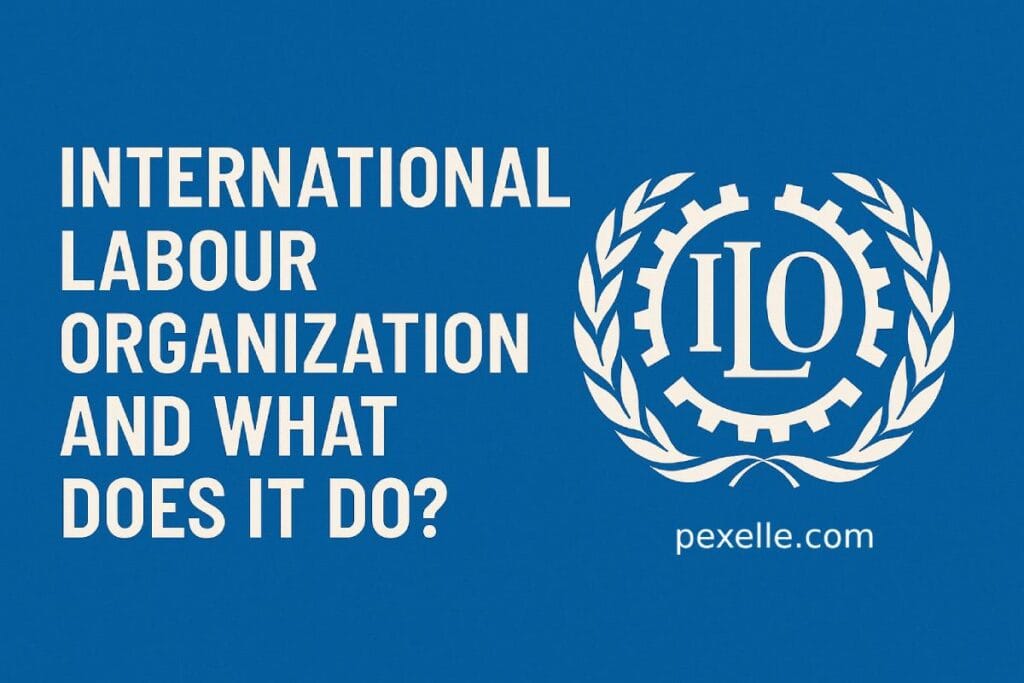What is the International Labour Organization (ILO) and What Does It Do?

The International Labour Organization (ILO) is a specialized agency of the United Nations established in 1919, in the aftermath of World War I. Its founding principle is simple yet powerful: “universal and lasting peace can be established only if it is based on social justice.” With this vision, the ILO has become the world’s leading institution in shaping labor standards, promoting fair working conditions, and advocating for human rights in the workplace.
🏛️ History and Structure
The ILO was created as part of the Treaty of Versailles that ended World War I and became the first specialized UN agency in 1946. What makes the ILO unique among international organizations is its tripartite structure. Each member state is represented not just by its government, but also by employers and workers’ organizations, giving all stakeholders a voice in labor policymaking. This model promotes social dialogue and consensus-building at the global level.
As of today, the ILO has 187 member states, and its headquarters is located in Geneva, Switzerland. Its governance is handled by the International Labour Conference, the Governing Body, and the International Labour Office—which acts as the organization’s permanent secretariat.
📜 Core Functions and Mandates
The ILO carries out a range of core functions, all centered on promoting decent work for all. These include:
1. Setting International Labor Standards
The ILO formulates Conventions and Recommendations covering all aspects of work, from wages and working hours to child labor and freedom of association. These legal instruments set the benchmarks for fair labor practices globally. Countries can ratify these conventions and incorporate them into national law.
2. Monitoring and Supervising Compliance
Through reporting mechanisms and on-the-ground missions, the ILO supervises the application of labor standards. It offers technical support to member countries to help implement reforms and improve compliance, particularly in developing economies.
3. Promoting Employment and Social Protection
ILO runs programs that support employment generation, skills development, and entrepreneurship, especially among youth and women. It also advocates for social protection systems, such as pensions, unemployment benefits, and maternity leave.
4. Advancing Social Dialogue
The ILO fosters negotiations and partnerships among governments, employers, and workers to resolve labor disputes, modernize policies, and respond to emerging issues like platform work and AI in the workplace.
🌐 Global Campaigns and Impact
The ILO has spearheaded several major global campaigns, including:
- The elimination of child labor (e.g., International Programme on the Elimination of Child Labour – IPEC)
- Ending forced labor and modern slavery
- Promoting gender equality at work
- Ensuring workplace safety and health (OSH)
One of the ILO’s landmark achievements is the adoption of the Declaration on Fundamental Principles and Rights at Work (1998), which outlines four core labor rights:
✔️ Freedom of association and collective bargaining
✔️ Elimination of forced labor
✔️ Abolition of child labor
✔️ Elimination of employment discrimination
In 2020, in response to the COVID-19 crisis, the ILO launched global assessments and recovery strategies to mitigate the pandemic’s effect on employment and social protection, highlighting its role as a crisis-response actor as well.
🔮 Future Priorities
Looking forward, the ILO is increasingly focusing on the future of work, especially in the context of:
- Digital transformation and automation
- Climate change and green jobs
- Migrant workers’ rights
- Inclusive and sustainable economic growth (aligned with SDG 8)
The ILO continues to adapt to new global realities, ensuring that workers’ rights are protected in a rapidly changing world of work.
✅ Conclusion
The ILO remains a cornerstone of the international community’s efforts to ensure dignity, fairness, and equality in the world of work. By promoting decent labor conditions, advancing social justice, and protecting vulnerable populations, the ILO plays a vital role in shaping a more equitable global economy.
💬 “Wherever there is injustice in work, the ILO is there to challenge it—and to build solutions rooted in dialogue, rights, and dignity.”
Source : Medium.com




